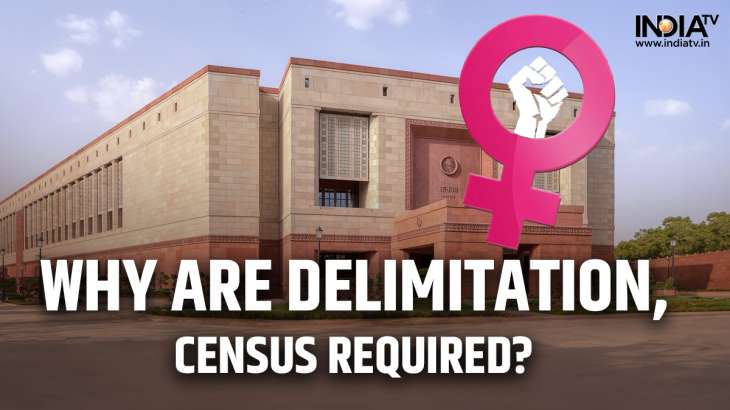Why is govt linking census, delimitation process with Women’s Reservation Bill implementation? Explained
[ad_1]

The opposition leaders criticised the government for linking the Women’s Reservation Bill to the next census and delimitation which caused a delay in the implementation of the historic legislation that gives a 33 per cent quota to women in the Lok Sabha and state assemblies.
People from all walks of life across the nation welcomed the Modi government’s move but also expressed concerns over the delay of the implementation. However, Home Minister Amit Shah in the Lok Sabha on Wednesday said the government will push census and delimitation process as soon as elections are over.
The census and delimitation exercise emerged as the biggest barriers in the way to the materialisation of a long pending dream of people who have been raising voices for the legislation.
The provisions in the Constitution (128th Amendment) Bill make it clear that the women’s reservation will come into effect only after the delimitation exercise or the redrawing of constituencies taking into account the data of the census conducted once the bill becomes a law. Constitutional experts said after the passage of the Bill by both Houses of Parliament, it will also have to be approved by at least 50 per cent of state assemblies to become a law. The nod by state assemblies is necessary as it affects the rights of the states.
Why is the census important?
The demography of a constiuency either for Lok Sabha or assembly does not remain constant. It keeps changing with the rising of the population. So, the census is required to understand the nature and numbers of the population so that the implementation of government policies achieves the objectives to benefit every citizen. The 2021 census exercise was postponed by the government in the wake of the COVID-19 pandemic. It will have to be put on a fast track by the government for the women’s reservation to be turned into reality before the 2029 Lok Sabha elections.
Why is delimitation important?
According to the Election Commission website, “Delimitation literally means the act or process of fixing limits or boundaries of territorial constituencies in a country or a province having a legislative body. The job of delimitation is assigned to a high-power body. Such a body is known as the Delimitation Commission or a Boundary Commission.” The delimitation within a fixed span of time is necessary. Failing to do it will lead to wide discrepancies in the size of constituencies, with the largest having over millions electors, and the smallest less than a lakh. The delimitation also determines the number of parliamentarians from a state and the number of members of the legislative assembly in a state. In the 2002 delimitation, the number of total MLAs in India increased from 3,997 to 4,123. The
History of delimitations in India
Delimitation took place four times in India – 1952, 1962, 1972 and 2002 — under Delimitation Commission Acts of 1952, 1962, 1972 and 2002.
Why has the government linked census, delimitation to the bill?
The number of MLAs and MPs in Lok Sabha did not change since 2002 while the population increased from over 128 crore to over 142 crore. The addition of 14 crore people to the population necessitated the census and delimitation. The government wants to implement the bill in the new setup so that changes after delimitation would not affect the constituencies earmarked for women candidates.
Also read: Nadda hits back at Congress on OBC row, asks why it did not work during UPA regime
[ad_2]
Source link
